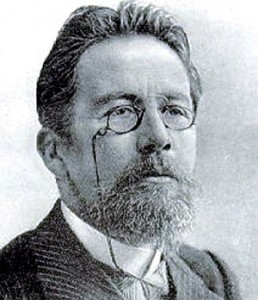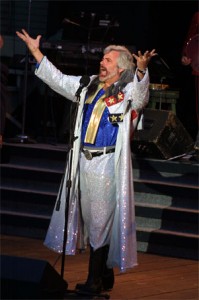Commedia Acting Tip: The Ghost of Chekhov
When I studied at the Dell’arte school of Physical theatre, our Commedia teacher (Michael Fields) would be coaching a scene or an improvisation and then suddenly say “Ah– the Ghost of Chekhov has entered the room.”
This was a short hand way of saying he meant that your performance had descended from a heightened state into naturalism or traditional acting, and that (to use a traditional acting term) you were playing your subtext.
Michael was also saying “We can see the playwright in your work.”  Commedia is centered on the actor, not the playwright. In many ways, it is not the situation that you are in that makes great commedia– after all, the situations are common– it is rather the way the actor reacts to the situation that makes the “play” compelling and interesting. In commedia, the eloquence of the playwright and the details and the foreshadowing and the “themes of the play” are not the important part. It is the extreme character reacting to the situation that he is in that makes it compelling to watch.
Another word Michael would use would be pedestrian. For him (and for me also) commedia actors can not and should not be pedestrian. If you were walking by and saw two commedia actors working on a scene– you shouldn’t think it was part of the everyday street life. You’d stop and take a look, and maybe call the cops about two weirdos acting kind of crazy.
I like to tell my students that if they were to walk in to McDonalds as their character (or to the library, or to work)–Â if they don’t get arrested, they aren’t doing something right.
It’s not that Chekhov’s ghost (that poor maligned creature) is a bad thing to have in the room– just not when you are doing a commedia show.



Pingback: Commedia Acting Tip: It’s All About the Appetite
Pingback: Commedia Acting Tip: The Ghost of Chekhov | Comedy For Animators
Which Chekhov? The playwright who wrote beautiful little comedies and begged someone to take them away from Stanislavski who mumbled, stumbled, made up his own words and turned his beautiful little comedies into tragedies; or his nephew who split the Moscow Arts Theatre on the basis that he believed imagination was the supreme ingredient in any performance not emotional memory?
sorry I happen to admire both Chekhovs especially the acting of Michael and his style of acting which lends itself beautifully to film and theatre and is especially good when you are creating character and not trying to be yourself.
forgot to mention that his was also about radiating a presence – something that every comedy actor needs.
Pingback: Acting Tips from the Commedia Dell ‘Arte. | Comedy For Animators